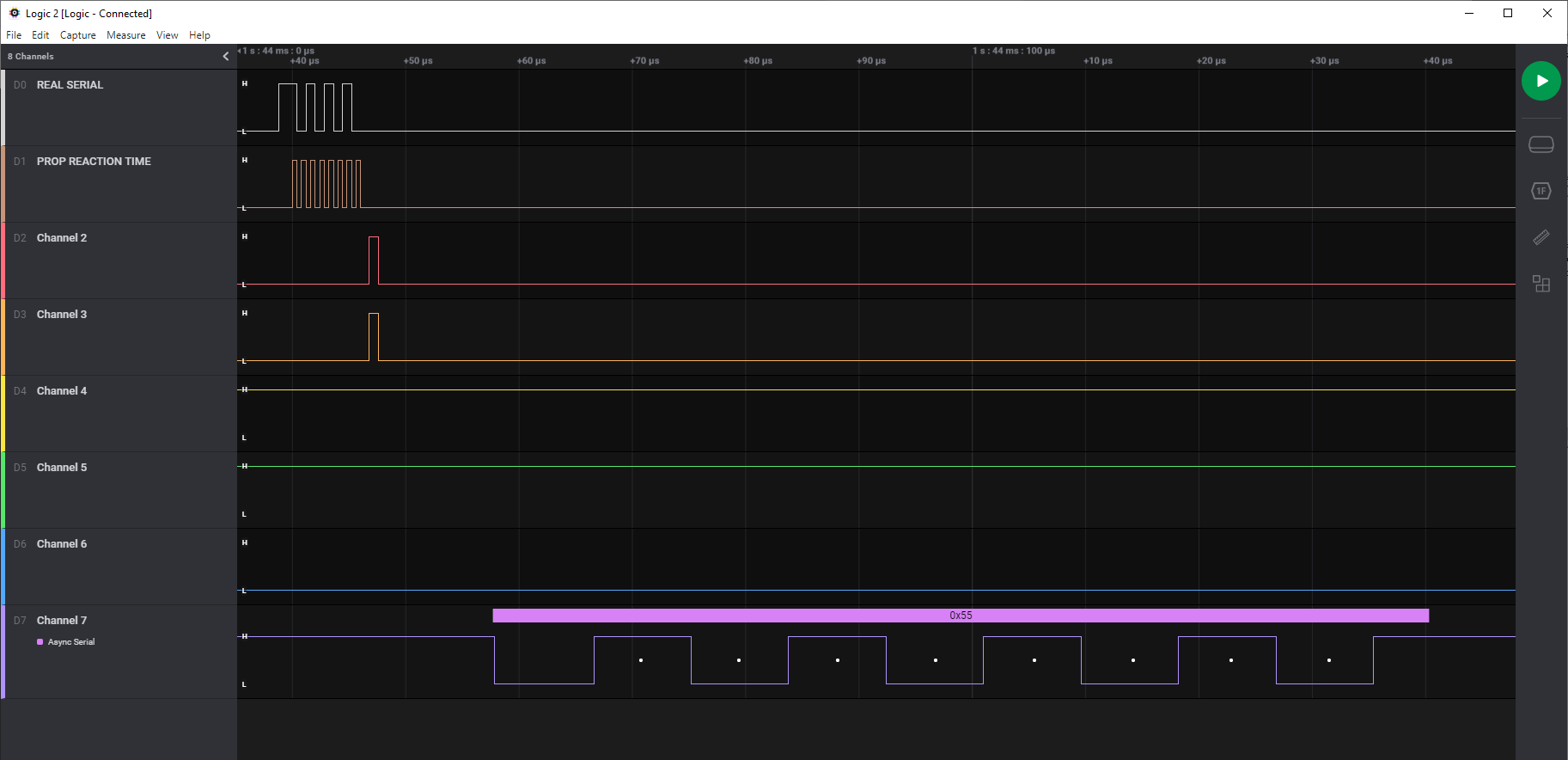[Solved] WAITPEQ problem - waits forever despite pin toggling at sensible speed
Can anyone deduce why the waitpeq instruction never responds to the RX_LATCH_PIN (P8, physical pin 13 on the 40-pin DIP)?
Both my oscilloscope and my logic analyser agree that this pin is indeed toggling. 3 microseconds HIGH, then 123 microseconds LOW. The signal is solid as a rock, no noise at all, no aliasing. The signal is actually generated by another pin driven from a different cog (cog 0 which is working perfectly according to the same scope and logic analyser).
The signal source is Cog 0: Pin 11 (output), and is physically hard wired to Cog 1 (the code below) Pin P8 (input). The wiring throughout the circuit is solid and free from intermittent faults.
As far as I can tell waitpeq never responds to the toggling pin. There are no short circuits happening (current usage is also perfectly stable and noiseless).
Here's the funny thing though, if I change the waitpeq into a waitpne, then the instruction NEVER waits, and always returns instantly and allows the serial port code to proceed and the loop runs without stalling.
Why is this waitpeq not responding to the toggling pin state?
org 0
C1_ENTRY
or dira, RS232_TX_PIN 'output
or outa, RS232_TX_PIN 'idle high
or dira, DEBUG
:c1_loop
CALL #Fast_RX
mov rs232_byte, fast_rx_byte
mov rs232_byte, #$55
CALL #RS232_TX
or outa, DEBUG
andn outa, DEBUG
jmp #:c1_loop
'receives a byte and stores it in fast_rx_byte
Fast_RX
waitpeq ALL_ONES, RX_LATCH_PIN 'wait for the pin to go HIGH
mov fast_rx_byte, ina 'then read the inputs
and fast_rx_byte, RX_PINS 'and keep the LSByte
Fast_RX_ret ret
'expects rs232_byte to contain the byte to send (gets clobbered)
RS232_TX
or rs232_byte, #$100 'insert stop bit
shl rs232_byte, #1 'insert start bit
mov rs232_count, #10 '10 bits because of start and stop bits
mov rs232_time, CNT
add rs232_time, RS232_BIT_TIME
:rs232_loop
rcr rs232_byte, #1 WC
muxc outa, RS232_TX_PIN
waitcnt rs232_time, RS232_BIT_TIME
djnz rs232_count, #:rs232_loop
waitcnt rs232_time, RS232_BIT_TIME
waitcnt rs232_time, RS232_BIT_TIME
waitcnt rs232_time, RS232_BIT_TIME
waitcnt rs232_time, RS232_BIT_TIME
waitcnt rs232_time, RS232_BIT_TIME
waitcnt rs232_time, RS232_BIT_TIME
RS232_TX_ret ret
'########################################
RS232_TX_PIN long |< 30
RS232_BIT_TIME long _xinfreq / 115200
RX_PINS long $000000ff '8 input pins in a block
RX_LATCH_PIN long |< 8 'input
ALL_ZEROES long $00000000
ALL_ONES long $ffffffff
DEBUG long |< 16
rs232_byte res 1
rs232_time res 1
rs232_count res 1
fast_rx_byte res 1
fit
This is driving me mad.


Comments
I've only ever used it waitpeq/pne spin, but in PASM I think the equivalent to how I would normally use it would be:
I think having ALL_ONES in the source field waits for every single I/O pin to be high.
In the code below, I've tried to reproduce the issue in spin. In the loop that runs in the secondary cog, if I wait for the state field to be ALL_ONES, the condition is never met, so sits there, as you've found. If I wait for the same as the mask field, however, it works, and the LED on pin 26 flashes.
CON _clkmode = xtal1 + pll16x _xinfreq = 5_000_000 VAR long stack[50] ' stack space for 2nd cog PUB Main outa[8] := 0 ' pin 8 low, and output dira[8] := 1 cognew(waitpin, @stack) ' start waitpin() in a new cog waitcnt(cnt + (clkfreq*2)) ' wait 2sec outa[8] := 1 ' now bring pin 8 high PUB waitpin repeat ' wait for pin 8's state (INA) to be high waitpeq(ALL_ONES, RX_LATCH_PIN, 0) ' doesn't work ' waitpeq(RX_LATCH_PIN, RX_LATCH_PIN, 0) ' works dira[26] := 1 repeat !outa[26] ' flash LED on pin 26 waitcnt(cnt + (100*(clkfreq/1000))) ' wait 100ms CON ALL_ONES = $ffff_ffff RX_LATCH_PIN = |< 8 ' = (1 << 8)EDIT: Resolved already, but updating code example with comments for potential passersby benefits.
Yes, you're right. Thank you.
Thanks also to Wuerfel_21 for the same sage advice on discord.
I had mistakenly thought that the AND with the mask happened to both parameters, which is not the case of course.
This community is so awesome.
Working now ...
...
